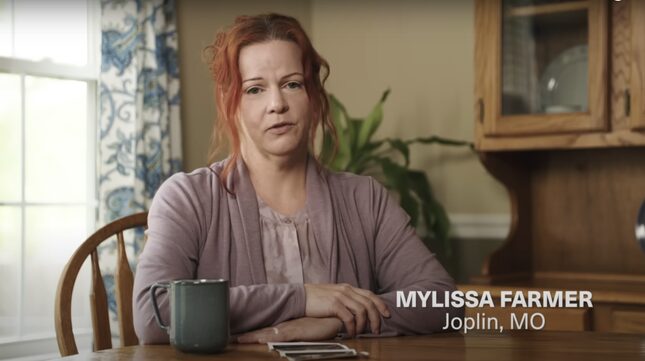Hospitals That Denied Woman Life-Saving Abortion Broke Federal Law, Biden Agency Rules
Mylissa Farmer was forced to travel from Missouri to Illinois to be treated for life-threatening pregnancy complications after her water broke at 17 weeks.
AbortionPolitics

In October, Mylissa Farmer came forward with her story of being forced to travel to Illinois in August, after being denied a life-saving abortion by two hospitals in her home state of Missouri and in Kansas due to its near-total abortion ban, which only has an ambiguous exception for threats to the life of the pregnant person. Farmer’s water broke at 17 weeks, and because the pregnancy had already been high-risk, doctors told her she faced increased risk of sepsis, loss of her uterus, and even death. Due to delays from being denied care from hospitals, by the time she reached a hospital in Illinois with the help of an abortion fund, Farmer was already in labor.
On Monday, the Associated Press reported that the Health and Human Services Department’s Centers for Medicare & Medicaid Services (CMS) opened an investigation into the two hospitals that turned Farmer away—the University of Kansas Hospital and the Freeman Health System—and determined that they had violated the Emergency Medical Treatment and Labor Act (EMTALA), a federal law that requires health care workers to provide life-saving medical care to stabilize a patient’s emergency medical condition. Last summer, shortly after the fall of Roe v. Wade, the Biden administration issued a reminder to hospitals that EMTALA requires them to offer life-saving abortion care and that the law supersedes state abortion bans.
CMS hasn’t announced fines or penalties the hospitals will face. AP reports that the hospitals received “notices warning that they were in violation of the law and asking them to correct the problems that led to Farmer being turned away.” Federal investigators will visit the hospitals before closing the ongoing case.
-

-

-

-

-

-

-

-

-

-

-

-

-

-

-

-

-

-

-

-

-

-

-

-

-

-

-

-

-

-

-

-

-

-

-

-

-

-

-

-








































